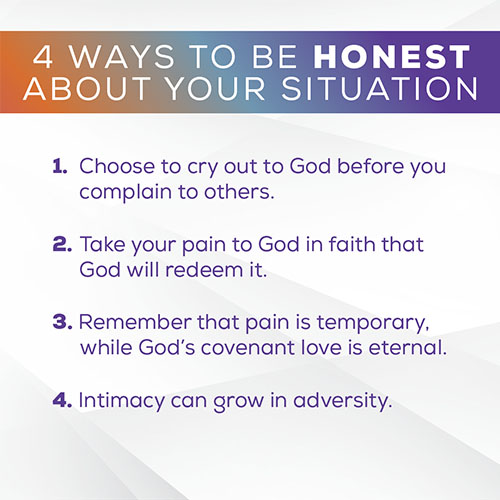
Ever posted something to social media in anger and later regretted it?
We all know that social media and intense emotions are a dangerous mix. We can text before we think, Facebook before we filter, and pop off before we pause to consider what’s wise.
Rage and anger seem to spread faster on social media than anything else. Complaining, shaming, and venting - that content gets lots of love and sympathy for others.
But, when the heat of the emotion dies down, what does it really change for the good?
A Healthier Way
During those times when things get really intense, the Scriptures point us to a healthier response to our pain - away from complaining and towards lamenting.
The words may seem quite similar to us, but to the writers of the Psalms, there was a dramatic difference. In an article exploring the value of lament, Dr. Glenn Packiam distinguishes between the two. “A complaint is an accusation against God that maligns His character, but a lament is an appeal to God based on confidence in His character.”
Complaints use harsh words to try and hurt others (including God), while laments take our harsh words to God. Laments invite God to meet us in our pain.
When we are in pain, overwhelmed, and grieving, we can take our pain to the world for short-term sympathy and validation. We can also take our pain to God as an expression of our solidarity with Him - in the hope that God can actually transform and redeem our pain.
The Pieces of a Lament
According to Dr. Packiam, many Old Testament scholars believe at least two-thirds of the Psalms fit into the category of lament.
Many laments include five parts. These parts aren’t always linear (one after the other), while some laments leave out the fifth part.
- Unguarded commentary. This is where the writer pours out their hearts before God - all the emotions and experiences, without filter or propriety. Just raw honesty!
- Accusation. “God, what you’re doing (or not doing) doesn’t fit Your character or promises.”
- 3. Recall. The Hebrews remembered God’s past acts through many annual festivals and communal experiences. Laments exercised those muscles to apply God’s pattern from the past to the present.
- 4. Surrender. “God, I’m going to trust you with this because no one else can change this circumstance; no one else can deliver us from this crisis.”
- 5. Gratitude. Many laments end with an expression of faith, declaring a future event as if it had already happened and acting in light of it in the present. The psalmists often thanked God in advance for answering their prayers.
Writing a lament amidst deep angst and confusion was a conscious choice to pray the pain as an offering before God.
If you’d like to write your own lament, we’ve provided a resource to help you experiment with this type of prayer:
Learn To Write A Lament
4 Things to Remember When Lamenting
As you write your prayer and practice lament, keep these four things in mind.
1. Choose to cry out to God before you complain to others.
If we were honest, how many of us call or text someone about our current problem before we take it to God?
Part of this lament form is both radical honesty but also a radical commitment to take those “offenses” before God.
There’s a place for pouring your heart out to a friend or sharing a burden with a friend, Galatians 6:2 calls us to “share each other’s burdens,” and James 5:16 commands us to “confess our sins to each other,” so that “we may be healed.” But, those should never replace crying out to God as the One with the power to change our circumstances.
2. Take your pain to God in faith that God will redeem it.
Within the lament form, we find a place for “accusation.” Asking questions and doubting God can be a good thing because it strengthens our faith; the faith of our future self depends on it. But it’s only a means to an end, not the end result.
Laments turn doubts into offerings. “I’m going to bring this before you, God. I’m going to let you have it. But I’m also going to lay this at your feet. And invite you to it. To do something here which will confirm your character and bring you glory.”
We serve a God who wastes nothing, including our pain. When we take our pain to God through lament, we’re doing so in faith that the story about our pain is still being written by the Great Author.
3. Remember that pain is temporary, while God’s covenant love is eternal.
David wrote many of the psalms, including some raw laments like Psalm 86. In the end, he doesn’t turn from his doubts because God’s actions changed, but because he comes back to God’s unshakable character and commitment. “But you, O Lord, are a God of compassion and mercy, slow to get angry, and filled with unfailing love and faithfulness.”
The Hebrew word for “unfailing love and faithfulness” is “HESED” (literally “covenant love”). This word is a direct reference back to the commitment to love in the covenant God made with the people and Moses at Mt. Sinai after delivering them from Egypt.
We use the word “love” for a lot of things. But, God’s HESED is not like our love. His love is faithful, eternal, unchanging.
When we’re feeling overwhelmed with pain and deep in crisis, we need to remember that our pain is temporary, and His love is eternal.
4. Intimacy can grow in adversity.
I learned to lament in a season of my life where God seemed distant and obstinate amidst pain that threatened to overwhelm me and others. In a toxic and painful situation, I learned that the Psalms gave me a model to pour out my pain as an offering that ended with praise.
Years later, I understood what God was up to, and He did redeem my pain. Laments don’t promise quick turnarounds, but they enable us to grow closer to God even while we wait for the outcome we want.
Laments are a way to make sure we don’t waste our waiting. Intimacy grows in adversity, with other people, and with God.

Scott Savage is a pastor and a writer who believes he has the best last name ever. He leads Cornerstone Church in Prescott, Arizona. Scott is married to Dani and they are the parents of three “little savages.” He is the creator of the Free to Forgive course and you can read more of his writing at scottsavagelive.com.





